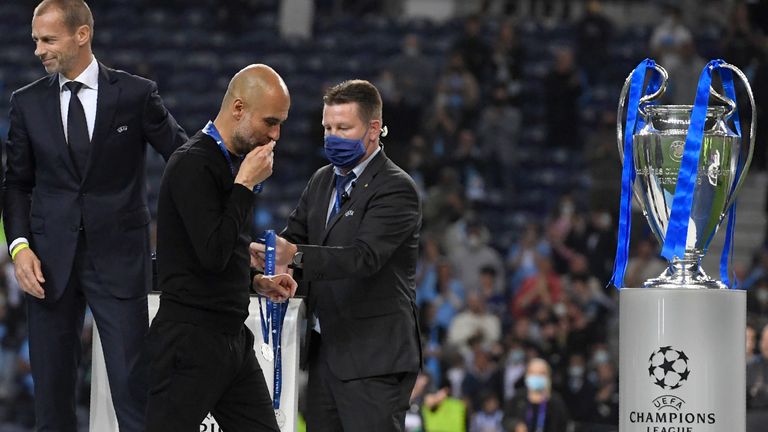Reason why manchester city wont qualify for champions league

The hallowed grounds of the Etihad Stadium have witnessed countless triumphs under Pep Guardiola’s stewardship, but as the 2024-25 season draws to a close, Manchester City finds itself in an unfamiliar and uncomfortable position. For the first time since 2017, the Citizens face the possibility of ending a campaign without silverware, and more critically, they stand on the precipice of missing out on Champions League qualification—a scenario that would represent one of the most significant setbacks in the club’s modern history.
A Season of Unprecedented Struggle
Manchester City’s current predicament would have seemed inconceivable just twelve months ago. The club that has dominated English football for over a decade, collecting Premier League titles with almost monotonous regularity, now sits sixth in the table with their fate hanging in the balance. This dramatic fall from grace represents not just a statistical anomaly but a fundamental shift in the competitive landscape of English football.
The numbers tell a stark story. As Manchester City prepares for their crucial home fixture against AFC Bournemouth on Tuesday evening, they find themselves trailing the top four by just a single point, with Newcastle United, Chelsea, and Aston Villa all within touching distance. However, City holds a crucial advantage: a game in hand that could prove decisive in their quest to secure European football’s most prestigious competition for another season.
Under the current UEFA regulations, the top five Premier League clubs will qualify for next season’s Champions League, a change that has provided an additional lifeline for teams like City who might otherwise face Europa League football. This expansion has created a safety net that Guardiola and his squad are desperately hoping to utilize as they navigate the final weeks of what has been a tumultuous campaign.
Guardiola’s Philosophy: Deserving Success
Pep Guardiola’s response to City’s precarious position has been characteristically philosophical yet pragmatic. The Catalan manager, renowned for his tactical acumen and unwavering principles, has made it clear that he believes success must be earned rather than assumed. “If we are not in the Champions League, it’s because we don’t deserve it,” Guardiola stated with typical honesty during his pre-match press conference on Monday. “And we’ll play the Europa League. So it is what it is.”
This acceptance of potential failure while maintaining competitive drive exemplifies Guardiola’s approach to management. Rather than making excuses or deflecting responsibility, he has shouldered the burden of City’s struggles while simultaneously expressing confidence in his team’s ability to rectify their situation. The manager’s assertion that “I’m thinking we’re going to qualify” demonstrates the delicate balance between realism and optimism that has defined his tenure at the club.
Guardiola’s target of finishing third in the Premier League table might seem modest for a club accustomed to title battles, but it represents a pragmatic acknowledgment of City’s current circumstances. The manager understands that in football, as in life, sometimes the most important victories are those that prevent defeat rather than deliver glory.
The End of an Era: Kevin De Bruyne’s Departure
Tuesday’s match against Bournemouth carries additional emotional weight as it marks the final home appearance for Kevin De Bruyne, the Belgian maestro who has been instrumental in City’s success over the past several years. De Bruyne’s departure represents more than just the loss of a talented player; it symbolizes the end of an era and the beginning of a transitional period for the club.
The timing of De Bruyne’s exit, coinciding with City’s most challenging season in years, adds poignancy to his farewell. Guardiola has been careful to emphasize that team objectives must take precedence over individual send-offs, stating, “I am going to decide the best, the best players to win the game against Bournemouth, that’s for sure.” However, he also acknowledged the midfielder’s contributions: “Kevin will get or deserve what he deserves. That is the best moment and best compliment for his incredible trajectory and what he has done.”
De Bruyne’s legacy at Manchester City is secure regardless of how this season concludes. His vision, creativity, and leadership have been fundamental to the club’s transformation into a global powerhouse. As he prepares for his final bow at the Etihad, both the player and the club will be hoping that his farewell coincides with securing Champions League qualification—a fitting end to a remarkable chapter in City’s history.
The Broader Context: English Football’s Competitive Renaissance
Manchester City’s struggles cannot be viewed in isolation but must be understood within the broader context of the Premier League’s increasing competitiveness. The traditional “Big Six” hierarchy has been challenged by ambitious clubs like Newcastle United, Aston Villa, and Brighton & Hove Albion, all of whom have invested heavily in players and infrastructure to bridge the gap to England’s elite.
This democratization of Premier League success has created a more unpredictable and exciting competition but has also made it increasingly difficult for any one club to maintain prolonged dominance. City’s current position, while disappointing for their supporters, reflects the healthy competitive balance that many observers have long desired to see in English football.
The expansion of Champions League qualifying spots from four to five for Premier League clubs has been a response to the league’s growing strength and global appeal. This change has provided additional opportunities for English clubs to compete at the highest level but has also intensified the battle for European qualification, as evidenced by the current congestion in the table’s upper reaches.
Tactical Adjustments and Squad Management
Guardiola’s tactical philosophy has rarely waivered throughout his career, but the current season has tested his adaptability like never before. The loss of key players through injury, form, and natural aging has forced the manager to reconsider his approach while maintaining the core principles that have brought him so much success.
The manager’s commitment to playing his strongest available team against Bournemouth, regardless of sentimental considerations surrounding De Bruyne’s farewell, demonstrates his unwavering professionalism. This decision-making process exemplifies the difficult choices that define successful management at the highest level.
City’s squad depth, once considered unparalleled in world football, has been tested to its limits this season. The emergence of younger players and the adaptation of established stars to new roles have been recurring themes throughout the campaign. Guardiola’s ability to extract maximum performance from available resources will be crucial in determining whether City can navigate their way back to European football’s top table.
The Financial and Reputational Implications
The stakes of Manchester City’s final matches extend far beyond mere sporting achievement. Failure to qualify for the Champions League would have significant financial implications for a club that has built its modern identity around competing with Europe’s elite. The revenue streams associated with Champions League participation—including prize money, broadcasting rights, and commercial partnerships—are substantial and influence everything from transfer spending to wage structures.
Moreover, the reputational damage of missing out on Champions League football could have long-term consequences for City’s ability to attract and retain world-class talent. Star players are drawn to clubs that offer the platform to compete for the game’s most prestigious prizes, and a season in the Europa League, while respectable, lacks the same allure as the Champions League’s bright lights.
The psychological impact on the squad and supporter base should not be underestimated either. Manchester City’s meteoric rise over the past fifteen years has created expectations of sustained excellence that missing Champions League qualification would severely dent. The mental resilience required to bounce back from such a setback would test the character of everyone associated with the club.
Looking Forward: Redemption and Renewal
Despite the current uncertainty, there are reasons for optimism at Manchester City. Guardiola’s track record of responding to adversity with renewed determination is well-documented, and the club’s infrastructure remains among the world’s finest. The current struggles may prove to be a necessary reset that allows for reflection, renewal, and ultimately, resurgence.
The manager’s confidence in achieving third place and Champions League qualification is not misplaced given City’s remaining fixtures and their game in hand advantage. The quality within the squad, combined with Guardiola’s tactical expertise, provides a foundation upon which to build a successful conclusion to the season.
Furthermore, the experience of navigating this challenging period may prove valuable in the long term. Adversity often reveals character and creates stronger, more resilient teams. If City can successfully navigate their way to Champions League qualification, the lessons learned during this difficult season could serve them well in future campaigns.
The Bournemouth Challenge
Tuesday’s opponent, AFC Bournemouth, represents the type of challenge that has characterized City’s season. The Cherries have established themselves as a solid Premier League club under Gary O’Neil’s management, capable of troubling any team on their day. For Manchester City, this fixture represents both an opportunity and a potential pitfall.
Bournemouth’s mid-table position might suggest a routine victory for City, but the Premier League’s unpredictability means no match can be taken for granted. The visitors will arrive at the Etihad without the pressure that weighs heavily on their hosts, potentially creating the conditions for an upset that could prove devastating to City’s European aspirations.
Guardiola’s emphasis on selecting his strongest available team reflects his understanding of the fixture’s importance. There can be no room for complacency or sentimentality; victory is the only acceptable outcome if City are to maintain control of their Champions League destiny.
Historical Perspective: City’s European Journey
Manchester City’s presence in the Champions League since the 2011-12 season represents one of the most successful periods in the club’s history. From relative European novices to tournament regulars and eventual winners in 2023, City’s journey has been remarkable. This context makes the possibility of missing out on qualification all the more significant.
The club’s European evolution under various managers, culminating in Guardiola’s tactical mastery, has been a source of pride for supporters and a testament to the successful transformation of the organization. Maintaining this standard has become an expectation rather than an aspiration, making the current situation all the more jarring.
The memories of dramatic European nights, tactical masterclasses, and unforgettable victories have become part of Manchester City’s modern DNA. Preserving this legacy through continued Champions League participation has become as important as domestic success in defining the club’s identity.
Conclusion: A Defining Moment
As Manchester City prepares for what could be a defining match against Bournemouth, the weight of expectation and consequence hangs heavy over the Etihad Stadium. Pep Guardiola’s honest assessment of his team’s situation—that they must earn their place in the Champions League through performance rather than reputation—encapsulates the reality facing one of world football’s most successful clubs.
The next few weeks will determine whether this season represents a temporary blip in City’s remarkable trajectory or the beginning of a more significant transition. Guardiola’s confidence in his team’s ability to secure third place and Champions League qualification will be tested against the unforgiving mathematics of the Premier League table.
Whatever the outcome, this season has already provided valuable lessons about the impermanence of success in modern football and the constant vigilance required to maintain excellence. For Manchester City, the immediate focus must be on the task at hand: defeating Bournemouth and taking a crucial step toward securing their place among Europe’s elite for another season.
The beautiful game’s capacity for surprise and redemption means that Tuesday’s fixture could mark either a continuation of City’s struggles or the beginning of their resurrection. For Pep Guardiola, Kevin De Bruyne, and the rest of the Manchester City family, the time for reflection has passed. Now, only results matter, and the Champions League beckons to those bold enough to seize their opportunity when it matters most.















